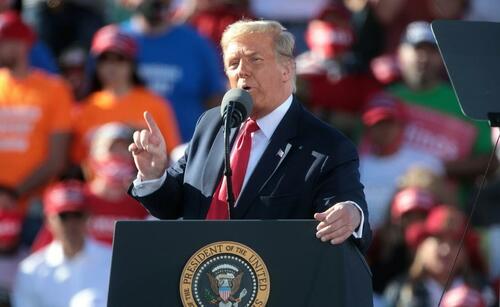Authored by Fred Lucas via 19fortyfive.com,
Is this what a party does when it can’t keep voting on articles of impeachment?

It’s been almost two years since former President Donald Trump’s defeat, yet House Democrats have managed to build an entire legislative agenda around Trump Derangements Syndrome.
The House Oversight and Reform Committee alone has been firing away Trump-obsessed legislation, as Democratic sponsors for bills on the Census, civil service, and whistleblower protections all cite Trump as a key part of the justification for the proposals. The common line connecting all the bills is to curb executive power that should be in the hands of an elected president and enhance the power of unelected and largely unaccountable bureaucrats.
Three of the bills that began in the oversight panel cleared the House Rules Committee this week to move to the House floor.
Trump Derangement Syndrome is clearly real. To be clear, it’s not necessarily better or worse than Trump sycophancy. Americans–whether serving in public office or everyday working stiffs–should never base their life around idolatry of or seething hatred for one prominent leader. But, of course, that has happened with Trump. I suppose polarizing is a shorter way to put it, but that term seems so trite.
Anyway, the anti-Trump side is presently being more ridiculous and pettier. If Trump sycophancy becomes a legislative agenda, I’ll reconsider that judgment.
The silliness of it all is that Trump might be the only Republican–at least top tier Republican–who could lose to either Joe Biden or Kamala Harris in 2024. While that’s questionable, House Democrats are advancing bills through committee as if they think he’s a sure thing come January 2025 – or water down a second Trump term as much as possible by weakening presidential authority.
Also, some of the bills are based on silly anti-Trump conspiracy theories. The bills would effectively politicize executive branch agencies that shouldn’t be.
HR 8326, dubbed the Ensuring a Fair and Accurate Census Act would make it more difficult for a president to fire a Census Bureau director, while also granting the director broad new authorities to conduct statistical sampling. It would expand the number of Census Bureau employees with civil service protections. It also constrains future censuses from inquiring about citizenship–which could favor Democrats for enumeration and apportionment.
When the oversight committee advanced the bill in July, committee Chairwoman Carolyn Maloney, D-N.Y., complained about the “Trump administration’s illegal efforts to weaponize the Census Bureau for political gain.”
House Oversight Committee Democrats Reps. Gerald Connolly of Virginia and Brian Fitzpatrick of Pennsylvania co-sponsored H.R. 302, dubbed the Preventing a Patronage System Act. The theory is that if Trump is elected, he would eliminate the civil service system and return to a spoils system.
The press release for the bill references Trump’s final months in office, when he signed an executive order creating a “Schedule F” category of federal employees.
The order determined that career employees with civil service protections involved with “policy-determining, policy-making, or policy-advocating” positions that are “not normally subject to change as part of a presidential transition” could be more easily removed for insubordination, which was a problem during the Trump administration.
This would affect a maximum 50,000 federal employees out of the 2.2 million federal workforce. That’s far from a patronage system.
The Whistleblower Protection Improvement Act, or H.R. 2988, certainly is a more innocuous sounding name, since many Republican lawmakers love whistleblowers that rat out Democrats. But this bill practically encourages bad actors in the federal workforce to simply engage in meritless accusations–thus abuse the legal whistleblower protections. Whistleblowers have significant legal protection now. But the bill would create a new legal veil around whistleblowers and enshrines whistleblower anonymity in all situations.
Connolly, the Virginia Democrat, said the bill comes “in the wake of the Trump administration’s assault on whistleblowers.”
Maybe considering the record of the Biden administration, Democrats feel they should keep reminding voters of Trump. Perhaps it makes good fundraising letters for these politicians to tell Democrat donors they are still sticking it to the bad orange man.
Still, one must wonder: if Trump had decided to fade from public life like most presidents, what in the world would hold Democrats together?



